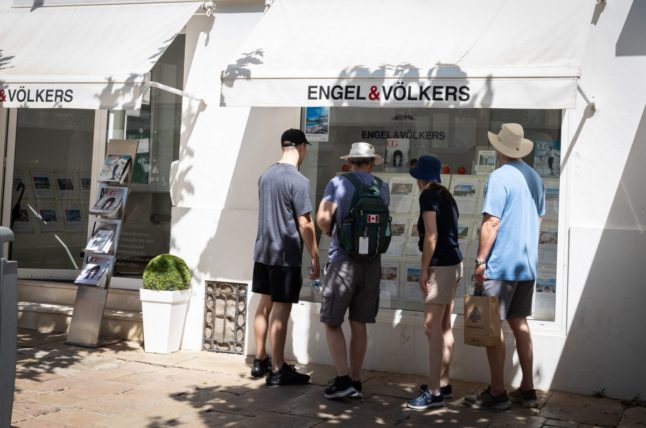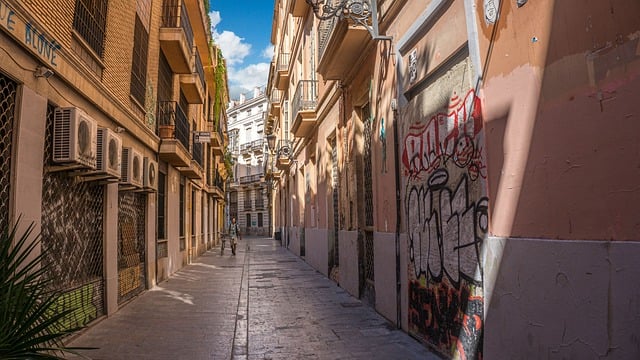The Spanish government shocked many when it ended the golden visa scheme in April. The visa offered residency rights to non-EU foreigners in return for purchasing property worth €500,000.
Amid rising rents and dwindling social housing stock, growing numbers of short-term tourist rentals and a bubbling anti-tourism sentiment in Spain, the government decided that cutting the golden visa would help.
However, many questioned whether the move was a purely policy decision or political manoeuvring, with the suggestion being that the move was performative and would make little difference in the long-run.
READ ALSO: When will Spain’s golden visa scheme officially end?
However, many regions of Spain are exploring limits on tourist accommodation, and Canary Islands nationalist party Nueva Canarias has demanded the regional government address the large number of property purchases by non-residents in the archipelago, and even suggested a limit on the number of properties that can be bought by foreigners altogether in the popular holiday islands.
Sumar, the far-left junior coalition partner in the Spanish government, has gone as far as proposing a three year ban on the purchase of housing by investment funds and non-residents in Spain.
For now, these sorts of radical proposals seem unlikely. But what would happen if Spain actually banned foreigners from buying property is certainly worth considering.
The legal context
According to Idealista, Spain’s premier property website, EU legislation makes a total ban on property purchases almost impossible. The prohibition of all restrictions on the movement of capital between Member States and third countries, which includes the purchase of real estate, means that any EU citizen essentially has the right to purchase property in any member state without significant restrictions.
As such, Arantxa Goenaga, partner and lawyer at AF Legis, points out that it could be possible to establish restrictions on who can buy a property in Spain, or establishing a series of residency requirements, such as in Malta, which requires a minimum of five years of legal residence to acquire a second home, but not an outright ban. “It should be clear that with the current European regulations this restriction cannot be imposed on EU citizens, but it could be contemplated for other countries outside the European Union.”
It’s true that Malta and Denmark both have certain restrictions on home ownership for foreigners, but these rules were negotiated before their entry into the EU. According to the EU rules as currently constructed, a ban wouldn’t be possible on EU citizens but perhaps it could be for non-EU nationals.
Pros
In theory, banning foreigners from buying property could do something to alleviate price speculation and make housing more affordable for local residents, bringing some stability to the real estate market, according to Mercedes Blanco, member of the Colegio Oficial de Agentes de la Propiedad Inmobiliaria (COAPI).
“The main beneficiaries would be local residents, who would have access to more affordable housing, and local governments, which would gain more control over urban development,” she told Idealista.
A ban there could, in theory, increase access to and bring property prices down for locals, two things that are among the main complaints made by Spaniards about the property market in recent years.
In that sense, such a move would likely be quite politically popular and viewed as a pro-active step by some Spaniards who feel the Spanish property market, along with its tourism model, is geared more towards foreigners than it is locals.
READ ALSO: Why does hatred of tourists in Spain appear to be on the rise?
Cons
However, a ban could also decrease foreign investment and affect the local economy, as well as reduce demand for new construction, which would impact employment in the construction sector.
“On the other hand, property developers could face lower demand and foreign investors would miss out on investment opportunities in attractive areas such as the Canary Islands,” Blanco says.
Foreign home owners in Spain also make a massive contribution to the Spanish economy. In 2022 foreigners with a second home in Spain contributed €6.35 billion to Spanish GDP and generated more than 105,000 jobs in the tourism sector, according to the study “The economic impact of residential tourism in Spain” done for the Spanish Association of Developers and Builders (APCE) by PricewaterhouseCoopers (PwC).
The financial contribution made by these second-home owners in Spain is clearly significant. In fact, experts point out that the money brought into the Spanish coffers by foreign homeowners is more than some Spanish industries.
“The contribution of residential tourism to GDP is triple that of the textile industry, double that of the timber industry and the same as the manufacture of pharmaceutical products in Spain,” Anna Merino, director of the Economics team at PwC, said when presenting the study.
Every euro spent by ‘residential tourists’ adds €2.34 to Spanish GDP. On top of this direct contribution to the Spanish economy, the surrounding economic activity associated with the spending generated 105,600 full-time jobs in 2022.
READ ALSO: Why Spain is unlikely to ever ban foreigners from buying property
Some experts even question the rationale that foreigners buying property necessarily pushes up house prices.
Joan David Janer, a Law professor at University of the Balearic Islands (UIB), told El Diario that any prospective ban would likely be based more in popular support than policy effectiveness: “Popular clamour may be one thing, but in this case there has to be data and reports that show that the rise in house prices is linked to purchases by foreigners.”
Alejandro Inurrieta, a former advisor to the Ministry of Economy and former president of Spain’s Public Rental Company, believes that the measure “would not solve anything.” He believes that the housing problem in Spain “is not expressly because foreigners are buying more or fewer houses, but because there is no affordable social and public housing.”
If Spain banned foreigners from buying property in Spain, such a move would be popular and likely receive political goodwill from Spaniards struggling to get on the housing ladder. There could even be a short-time moderation in prices and greater access to the market for locals.
However, EU legislation means that this could only realistically be done for non-EU nationals, which means the Spanish property market would still be exposed to wealthier migrants from Northern European countries that could continue pricing out locals.
Furthermore, some experts question whether or not the ban would have any real impact on prices, and banning foreigners would also remove a significant chunk of foreign investment and income into Spain and could harm local economies.
Any ban, whether it be outright, limited, or restrictions and rules on residency, would need to be accompanied by a mass house building project of affordable, accessible social housing in Spain.
READ ALSO: EXPLAINED: How Spain plans to address its huge lack of social housing



 Please whitelist us to continue reading.
Please whitelist us to continue reading.
Member comments